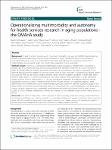Operationalizing multimorbidity and autonomy for health services research in aging populations - the OMAHA study
Holzhausen, Martin
Fuchs, Judith
Busch, Markus
Ernert, Andrea
Six-Merker, Julia
Knopf, Hildtraud
Hapke, Ulfert
Gaertner, Beate
Kurzawe-Seitz, Ina
Dietzel, Roswitha
Schödel, Nadine
Welke, Justus
Wiskott, Juliane
Wetzstein, Matthias
Martus, Peter
Scheidt-Nave, Christa
Background: As part of a Berlin-based research consortium on health in old age, the OMAHA (Operationalizing Multimorbidity and Autonomy for Health Services Research in Aging Populations) study aims to develop a conceptual framework and a set of standardized instruments and indicators for continuous monitoring of multimorbidity and associated health care needs in the population 65 years and older. Methods/Design: OMAHA is a longitudinal epidemiological study including a comprehensive assessment at baseline and at 12-month follow-up as well as brief intermediate telephone interviews at 6 and 18 months. In order to evaluate different sampling procedures and modes of data collection, the study is conducted in two different population-based samples of men and women aged 65 years and older. A geographically defined sample was recruited from an age and sex stratified random sample from the register of residents in Berlin-Mitte (Berlin OMAHA study cohort, n = 299) for assessment by face-to-face interview and examination. A larger nationwide sample (German OMAHA study cohort, n = 730) was recruited for assessment by telephone interview among participants in previous German Telephone Health Surveys. In both cohorts, we successfully applied a multidimensional set of instruments to assess multimorbidity, functional disability in daily life, autonomy, quality of life (QoL), health care services utilization, personal and social resources as well as socio-demographic and biographical context variables. Response rates considerably varied between the Berlin and German OMAHA study cohorts (22.8% vs. 59.7%), whereas completeness of follow-up at month 12 was comparably high in both cohorts (82.9% vs. 81.2%). Discussion: The OMAHA study offers a wide spectrum of data concerning health, functioning, social involvement, psychological well-being, and cognitive capacity in community-dwelling older people in Germany. Results from the study will add to methodological and content-specific discourses on human resources for maintaining quality of life and autonomy throughout old age, even in the face of multiple health complaints.
No license information

